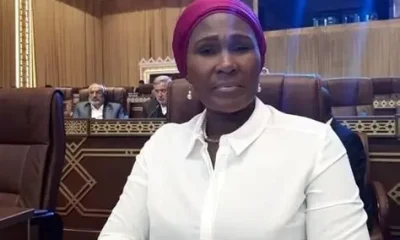Published
12 months agoon

In politics, the ability to set and control the narrative is a crucial determinant of success. Those who dictate the conversation often shape public opinion, influence voter behavior, and steer the national agenda. This power of narrative control has become increasingly evident in Ghana’s political landscape, where the National Democratic Congress (NDC) seems to frequently relinquish this advantage to the New Patriotic Party (NPP).
A recent example illustrates this pattern. The NDC launched its manifesto with much fanfare just last Saturday, positioning it as a key moment to communicate its vision and policies to the electorate. However, instead of dominating the news cycle and leveraging the momentum, the focus among many NDC supporters and communicators quickly shifted. In a puzzling move, they began “previewing” Dr. Mahamudu Bawumia’s upcoming media encounter, diverting attention away from their own agenda. This gave the NPP an opening to seize the narrative.
Within just 24 hours of the NDC’s event, Dr. Bawumia held his press conference, effectively eclipsing the NDC’s manifesto discussions. On social media, where political discourse thrives, many prominent NDC figures were again preoccupied with “reviewing” Bawumia’s performance rather than dissecting their own manifesto. In any political contest, allowing your opponent to set the terms of discussion means losing the opportunity to highlight your achievements and ideas. The NDC’s tendency to react rather than lead the conversation reflects a deeper communication strategy problem that has long plagued the party.
This issue is not new. Over the years, the NPP has consistently demonstrated its proficiency in media management and narrative control. Even when faced with allegations of corruption or governance failures, the NPP often manages to shift the discourse in its favor. For instance, despite the efforts of media personalities like Kevin Taylor, who exposes alleged corrupt practices within the NPP government, these stories tend to lose traction within days. The NPP’s ability to reframe the conversation and move public attention away from unfavorable topics is a testament to its strategic approach.
Moreover, NDC Member of Parliament for North Tongu, Samuel Okudzeto Ablakwa, has repeatedly exposed what he calls “state capture” by government functionaries, detailing cases of alleged land grabs and other corrupt practices. Yet, these exposés seldom translate into sustained political capital for the NDC. Instead of building long-term narratives around such revelations, the party appears content to let these issues fade without maximizing their impact.
One glaring issue within the NDC’s communication strategy is its apparent focus on rhetoric rather than substance. The party’s communications team, led by Sammy Gyamfi, is often praised for its articulate and assertive stance, but effective communication in politics goes beyond delivering fiery speeches. It involves strategic agenda-setting, framing issues in a way that resonates with voters, and ensuring that your message remains dominant in public discourse. Unfortunately, the NDC’s communicators seem more interested in the applause that comes with talking tough than in sustaining narratives that could sway undecided voters or reinforce the party’s position.
The deputy communications director, Malik Basintale, is another case in point. His frequent declarations about imprisoning corrupt NPP officials if the NDC returns to power may resonate emotionally with the party’s base, but they lack credibility and strategic depth. Ghanaians have heard such promises before, only to see little follow-through when governments change. These tough-talking soundbites do little to advance the NDC’s long-term narrative and risk being dismissed as empty rhetoric.
The NPP, on the other hand, appears to have recognized the value of consistently grabbing media attention and has made it a cornerstone of its strategy. From the “Break the 8” campaign to timely press engagements, the party consistently frames discussions in ways that keep them on the front foot. By mastering the art of agenda-setting, the NPP keeps its opponents in a reactive position, forcing them to respond rather than initiate.
The NDC has much to learn from this approach. If the party hopes to be more effective in the lead-up to the 2024 elections, it must reassess its communication strategy. This involves not only refining its messaging but also ensuring that it remains in control of the narrative. Rather than allowing the NPP to dictate the terms of discussion, the NDC should focus on consistently amplifying its own message, keeping public attention on its policies and achievements, and framing issues in a way that aligns with its electoral goals.
In today’s media-driven political environment, those who control the narrative control the conversation—and ultimately, the outcome. The NDC can ill afford to remain a follower in this regard. A shift from reactive communication to proactive narrative-setting is essential if the party is to remain competitive and win over the hearts and minds of Ghanaian voters.
Source: GhanaFeed.Com


NDC Executives in Bawku Threaten Mass Resignation Over Unresolved Conflict


High Court Dismisses NPP’s Bid To Stop Ablekuma North Rerun


Volta NDC Youth Wing Condemns Attack On Ho Central Constituency Office


NDC Takes Election Dispute To Court Of Appeal, Seeks Reversal Of High Court Ruling In NPP’s Mandamus Application


Obuasi East NDC Withdraws Court Case Challenging Re-Declaration Of Election Results


NDC Condemns Electoral Commission’s Decision to Rerun Polls in Dome-Kwabenya
